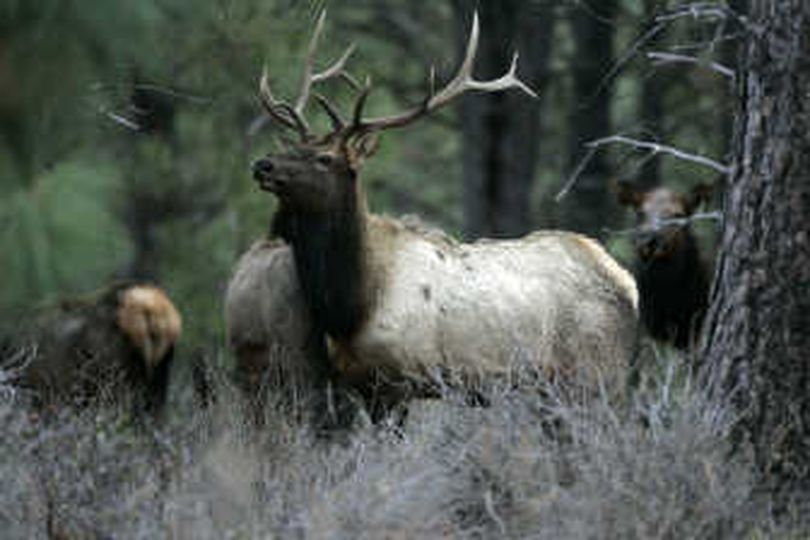Bill seeks to contain Colockum elk herd, keep them off crops, roads

WILDLIFE -- Managing elk is a complicated business, as indicated by a Washington lawmaker's reasoning for introducing a bill that, in part, seeks to contain the Coluckum elk herd with winter feeding.
Few hunters would say there are too many elk in the Colockum, but Rep. Tom Dent, R-Moses Lake, did.
If you're a rancher feeding an additional 100 head (or likely more) of elk during winter, you might think so, too.
If you're a motorist who collided with an elk at 70 mph on I-90 you also might say the elk numbers are too high.
Really, there aren't too many elk. It's a people problem. But it must be addressed. If wildlife managers had to deal only with critters, their job would be much easier.
Following is a report via AP on the reasoning and a few of the details in House Bill 1353:
OLYMPIA (AP) – A bipartisan bill regulating elk population and wildlife property damage sponsored by Rep. Tom Dent was passed by the Agriculture and Natural Resources Committee during executive session.
House Bill 1353 would direct the Department of Fish Wildlife and the Department of Transportation to pilot an elk management program to reduce car accidents and property damage caused by the Colockum elk herd.
“We need to start working out ways to keep them happier and keep them where they belong,” said Dent, R-Moses Lake. “That is not on the interstate or on all the other county roads either.”
During the executive session, two amendments written by Dent were added to the bill. The first amendment gave the Yakima Nation input on the elk management program. Dent said it was an oversight to not include their input in the original draft of the bill.
The second amendment was a clarification on the restrictions of feeding elk. The goal of the bill is to discourage animals from congregating on farms and near high traffic areas. The amendment clarifies that when elk consume animal feed ranchers leave for their own livestock, it does not qualify as feeding the wildlife. Dent said he did not want to inadvertently penalize the group the bill is aimed at protecting.
The chair of the Agriculture and Natural Resources Committee, Rep. Brian Blake, D-Aberdeen, co-sponsored the bill and urged the committee to vote yes. He said he had seen large herds of elk from the highway and when traveling around Washington and felt it was a serious safety problem.
“There are some real issues here,” Blake said. “I applaud the member for the work he’s done with the stakeholders to try to move the issue forward.”
Dent sponsored another bill that deals with wildlife damage to farms, House Bill 1399, which was not voted on in executive session. Dent said a member of the committee had concerns about the source of the funding and until that part of the bill could be clarified, it would not go before the committee.
The bill would expand the number of crops eligible for damage compensation from elk and deer from commercial crops only to all agriculture crops. It would increase the maximum amount the Department of Fish and Wildlife may pay in total damages from the State Wildlife Account in a year from $120,000 to $240,000. Lastly, the bill would increase the maximum compensation for each claim of damage from $10,000 to $20,000.
“The problem is we have too many animals and we need to better manage the animals,” Dent said. “They need to figure out where they can keep them that they are not causing property damage and other issues for ranchers.”
